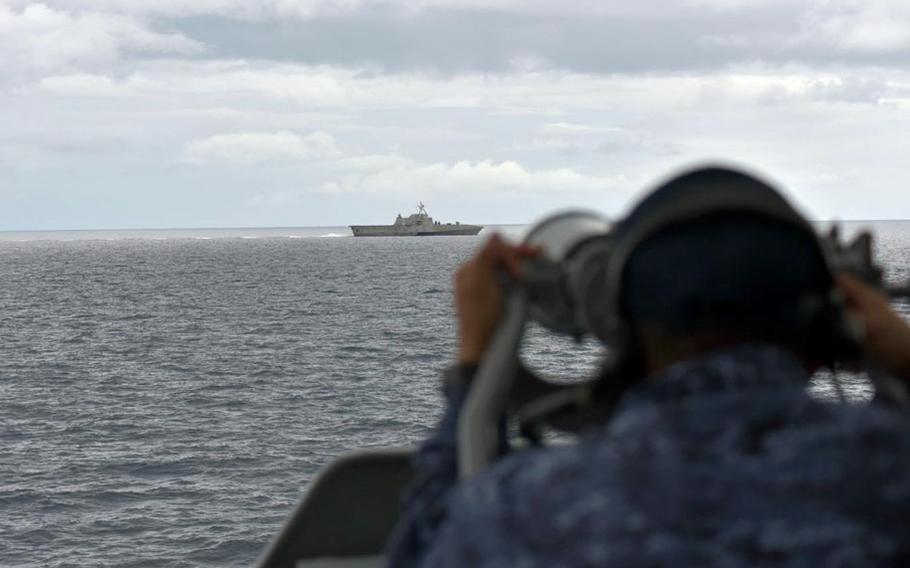
A sailor aboard the Japan Maritime Self-Defense Force destroyer JS Kirisame a monitors the littoral combat ship USS Oakland during an exercise near the Solomon Islands, Monday, Aug. 8, 2022. (Japan Maritime Self-Defense Force)
In May of 2017, I was in Kyoto, Japan, sitting on the patio of a Starbucks while scrolling through news headlines on my phone. The top story that day was that North Korea had test-fired an intercontinental ballistic missile, which had landed in the Sea of Japan. Yet, everyone around me was carrying on with their day, seemingly unbothered.
It’s the sort of danger that the Japanese have come to live with. Japan occupies one of the most precarious geographical positions anywhere in the world. Its closest neighbors include Russia, North Korea and China. Earlier this year, North Korea resumed test-firing of ICBMs off Japan’s coast. More recently, using House Speaker Nancy Pelosi’s visit to Taiwan as a springboard, China has been acting more belligerently than usual. Following Pelosi’s trip, China fired several missiles that landed in waters that fall within Japan’s exclusive economic zone. Given the tumult in Europe and Asia, respectively, America’s military might risks being spread too thin. Our allies will need to shoulder more of the burden in defending democracy abroad.
To that end, Japan’s postwar constitution, in place since 1947, poses a hindrance. Article 9 of the Japanese Constitution states, in part, “The Japanese people forever renounce war as a sovereign right of the nation and the threat or use of force as means of settling international disputes.” To that end, Article 9 continues: “Land, sea, and air forces, as well as other war potential, will never be sustained.” Drafted by American legal scholars after World War II, with the enthusiastic support of Gen. Douglas MacArthur, the provision sought to extinguish Japanese militarism for all time.
The pacifist constitution was idealistic but shortsighted — the product of nearly a century of tensions between the U.S. and Japan from 1853 to 1945. Between Commodore Matthew Perry’s demand that Japan open its ports to foreigners, American annexation of the Hawaiian Islands, exploitation of Japanese nationals in California and the Pacific theater of World War II, a future alliance between the United States and Japan would have been difficult to imagine. Nevertheless, Japan now stands as one of America’s foremost allies.
For decades Japan has grappled with what to do about its constitution. Former Prime Minister Shinzo Abe, who was assassinated last month, was a staunch proponent of amending Article 9 to give the Japanese military a sound constitutional footing. In the elections taking place in the immediate aftermath of Abe’s death, his Liberal Democratic Party won a sweeping victory. But exit polls indicate that just 3.2% of LDP voters did so on the basis of revising the constitution. Polls further indicate that just 36% of Japanese support revising the constitution, while 38% are opposed.
To be sure, Japan’s constitutional provision barring it from maintaining a military has long been honored more in the breach than the observance. Notwithstanding the command of Article 9, Japan retains one of the largest militaries in the world. To keep it “constitutional,” the Japanese military is humbly referred to as the Japanese Self-Defense Force. Still, Japan spends only about 1% of its gross domestic product on defense, which is a pittance relative to what current circumstances demand. Amending Article 9’s pacifist provisions should allow for more spending on national defense and further strategic cooperation among Japan, South Korea and the United States.
American backing of a revision to Article 9 would be provocative, but a powerful Japan is the best hedge against an aggressive China. It would send a strong signal to Beijing about the costs of provoking a general war in the Pacific. What’s more, it would send a message to the nations of Asia that, however zealous China may be in its efforts to assert its dominance, the democracies of the region are willing and able to defend liberty in an equal and opposite measure.
In the month when we observed the 77th anniversary of the atomic bombings in Hiroshima and Nagasaki, it’s worth contemplating the horrors of war and particularly the damage that can be wrought by nuclear weaponry. Today, right in the middle of downtown Hiroshima, there remains a ruined building — the only structure remaining from the area in which a nuclear bomb went off so many years ago. It still stands as a somber reminder amid a now-bustling, modern city.
Tyler Michals is a practicing attorney in Chicago.